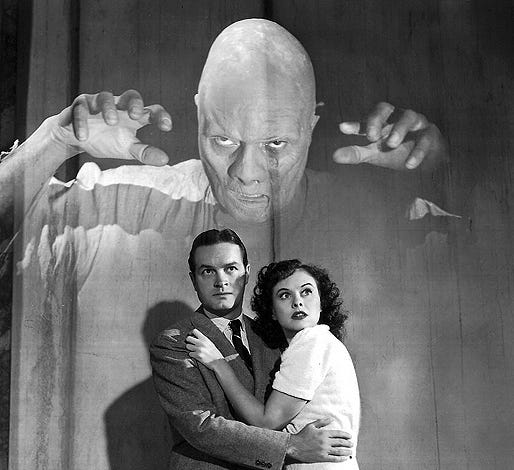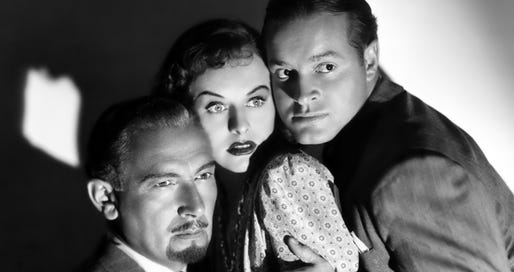Cinema Blind Spots: The Ghost Breakers (1940)

We all have films we really, really want to see, but many of them never make it from our Blu-ray shelves to the television, and simply remain on a list for years. As an aspiring film historian, I have read so much about, and seen so many signature scenes from, several important films that, honestly, I sometimes forget to actually watch them from beginning to end. And in other cases, there are pop-culture hits that I have yet to make a priority. So I have decided to use this column as motivation to check off many of the titles I’ve wanted to see for so long. These are my Cinema Blind Spots.
On May 29, iconic comedian Bob Hope would have turned 112 years old. Living until the ripe old age of 100, he died in 2003, leaving a legacy of film and TV masterworks. I, however, had never sat through a single work in its entirety. So to celebrate this goofball’s special day, I thought I would choose a film of his that both displayed that classic Hope style and most interested me on a personal level. “The Ghost Breakers” (1940) was my choice.
The film is not the blind spot here, but rather Hope himself. Leslie Townes “Bob” Hope was born in 1903, in London, England. By his teenage years, he was a street performer, singing, dancing, and working on comedy routines. Hope later moved to the states, and like so many comedians of his time, worked in vaudeville before changing his name to Bob and deciding to make an attempt at the movie business.
Hope caught some traction in 1938 after signing with Paramount Pictures and working with W.C. Fields in “The Big Broadcast of 1938." It was the first time Hope performed what would later become his trademark song, “Thanks for the Memory” — a duet with Shirley Ross in the film. He and frequent co-star Paulette Goddard worked together on “The Cat and the Canary” (1939), which, being one of his most famous works, might have been a more justifiable choice for this week’s blind spot. Many people know him for his work on radio, TV and with the troops abroad, always supporting the soldiers and performing for them anytime he was able.
But while researching what many consider Hope’s best films, I noticed George Marshall's “The Ghost Breakers” was on many best lists, usually somewhere near the top. Bosley Crowther, critic for the New York Times in 1940, said “not many pictures can make your goose-pimpled sides shake with laughter, but this one does.” After watching a few clips and reading about it further, I found "The Ghost Breakers" to be the most compelling, thus I present my thoughts to you now.
“The Ghost Breakers” is a classic 1940s horror/comedy/mystery in the vein of the Abbott and Costello monster movies by Universal. IMDB describes it as “a radio broadcaster, his quaking manservant and an heiress investigate the mystery of a haunted castle in Cuba.” Note, his “manservant” is a black man named Alex who talks like a slave — “Heya, boss, you ain't goin' upstairs, are ya? Where those ghost is?” They might have been able to make it worse by throwing in a “Massa,” but luckily they didn’t. I’ll avoid talking about the inherent racism that worked its way through Hollywood pictures at the time in an attempt to avoid further digression. That’s a commentary of its own.

The cast is pretty entertaining. Goddard is a natural in those early comedy romps. Having worked with Chaplin ("Modern Times") and Hope prior, among others, she was no rookie to the comedy scene. Here she plays Mary Carter, a beautiful, young, wealthy heiress who recently inherited a castle in Cuba known for being haunted and rife with mysterious "voodooism," as a character calls it. Willie Best plays Larry’s Butler, Alex. Although socially irresponsible in his treatment by today’s standards, he is really good here. I thought he was pretty funny, and added a much needed element to the picture, balancing Hope’s character perfectly. Richard Carlson, Paul Lukas and Anthony Quinn all perform effortlessly, contributing to the overall mystery, and appropriately misleading you at every turn.
It is no surprise Hope is the real star here. I’ll admit, Hope is not my favorite personality comedian — not by a long shot — but he certainly has that “something.” His timing is on point in “The Ghost Breakers,” and is only emphasized by a good supporting cast. You can see his influence on Woody Allen with quick one-liners like “The girls call me Pilgrim, because every time I dance with one I make a little progress” or, when the power goes out during a storm, “Basil Rathbone must be having a party.” These lines keep the film alive.
Beyond the performances, the production is well executed. For personality comedies, it’s normally more about the stars more than the sets, cinematography or sound. However, all three of those elements are adequate here. The castle sets are reminiscent of the old Universal horror sets — not quite as elaborate, but with a comparable grim and eerie quality. There is a wonderful “zombie” in the film, as well as a super-imposed ghost that has such a great effect despite its aged look. With it being a comedy first, the quality of the effects often gets a pass mainly because although they look cheesy now, they play to the film's comedic strengths.
It goes without saying that “The Ghost Breakers” is a product of its time. Certain aspects are timeless, but this type of comedy isn’t made anymore, at least not like this. When looking at it within its historical context as a Bob Hope film, does it hold up? I’d say so, yes. It’s still entertaining if you’re open to that type of Classic Hollywood-era comedy, and it acts as a time capsule for a standard of the past. The performances may repel some viewers, but the film is consistent and allows you to acclimate to its techniques.
It was nice to finally experience the iconic style that has influenced so many. I feel like good writing and precise comedic timing are so rare these days. Comedies are often created in the editing room, and the pacing comes from splices in the scenes. These old veterans knew how to work a long take, and milk as many laughs as they could without stealing the show from their supporting counterparts. I believe contemporary filmmakers could learn a lot from these old-Hollywood comedies, and Bob Hope is one of several reference points to consider.
Next week I will talk about Wes Craven's “Scream” (1996). Feel free to get caught up and let us know your thoughts on “The Ghost Breakers,” “Scream” or movies you would like to see me check off the list in the comments below.


